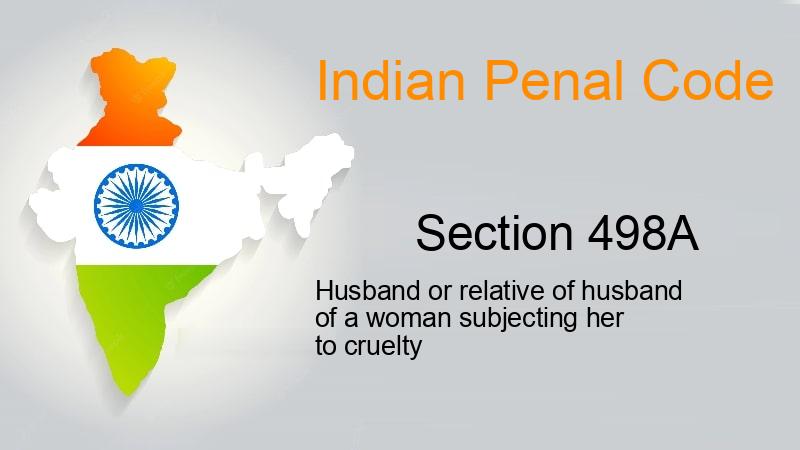Section 498A of the Indian Penal Code (IPC) deals with the offense of cruelty by a husband or his relatives towards a woman. This section was introduced to address the rising instances of cruelty and harassment faced by married women, particularly related to dowry demands. Here are the legal dimensions of Section 498A:

Section 498A IPC: Cruelty towards a Woman
In 1983, with the passing of the Criminal Law (Second Amendment) Act, Section 498A was added to the IPC. The goal of this clause is to prevent the husband or other family members from torturing his wife for dowry and to punish him or them if he or they do so. The general sections of the IPC dealing with assault, hurt, seriously hurt, or homicide applied prior to 1983 to harassment of a wife by her husband or in-laws. However, increased incidences of bride burning and other violence against women, especially young ladies who are newly married, caught everyone’s attention. General IPC provisions were deemed insufficient to address the heinous crimes committed against women. The Parliament decided that three layers of legislation were necessary to address this issue head-on:
- To define the underlying offence of cruelty to women by spouses and relatives of husbands.
- To implement policies that require an investigation into specific deaths of women.
- In order to more easily bring perpetrators of violence against women to justice, it is necessary to amend the Indian Evidence Act, 1872.
In light of this problem, the Indian Penal Code (IPC) was amended to include both Section 498A and Section 304B (dowry death). Subsequently, Section 174 of the Criminal Procedure Code was revised to require inquests to be conducted by executive magistrates in the event of a suicide or suspicious death involving a woman within seven years of her marriage. A new Section 113B of the Evidence Act states that if it can be proven that a woman died shortly after being exposed to cruelty or harassment by a person in connection with a demand for dowry, then it will be presumed that the harasser was responsible for the lady’s death.
The purpose of Section 498-A is to safeguard married women from abuse by their husbands or their spouse’s family members. A maximum sentence of three years in prison and a Rs. 30,000 fine has been set. The term “cruelty” has been broadly defined to include acts of harassment with the intent to pressure the woman or her family into meeting any unlawful demand for any property or valuable security, as well as acts of bodily or mental harm to the woman’s body or health. The harassment based on a woman’s ability to pay a dowry falls under the purview of the section’s final subsection. One element of “cruelty” is engineering a circumstance in which the woman is motivated to take her own life.
Essentials of Section 498A
For this Section to apply, certain prerequisites must be met. The following are some of these:
- It’s essential that she should be a married woman. This provision was added to shield wives and female relatives from abusive treatment at the hands of their husbands and/or male relatives.
- That woman must have experienced either brutality or harassment. The term “cruelty” can refer to a wide variety of behaviours. To demand a dowry is harsh in and of itself.
- Such brutal harassment should have been demonstrated by either the spouse or the husband’s family, if not both.
Nature of offence under Section 498A
Section 498A offence has the following nature:
- Cognizable: Cognizable crimes are those where the police can arrest without a warrant, whereas non-cognizable offences are those where the police cannot arrest without a warrant. Law enforcement has an obligation to report and investigate any crime that meets the legal definition.
- Non-bailable: If a complaint is lodged under Section 498A, the magistrate can refuse bail and send the accused to court or police custody without the need for a bail hearing.
- Non-compoundable: A petitioner cannot withdraw from a non-compoundable case i.e. cannot settle outside court (such as a rape or 498A charge) with the exception of the Indian state of Andhra Pradesh, where the latter charge has recently been rendered compoundable.
Cruelty covered under Section 498A
Cruelty is the intentional or reckless infliction of pain or distress to another person or animal. Under criminal law, cruelty can refer to punishment, torture, victimisation, cruel behaviour, etc. It could also mean ‘inhumane’ treatment towards individuals. When one person intentionally causes harm to another or does nothing when they could prevent harm, this is called cruelty. Cruelty, undoubtedly, is a fairly general phrase that encompasses a vast range of concepts. Any form of cruelty, whether physical, mental, or emotional, is unacceptable. Intentional and unintentional psychological and bodily harm are both protected under Section 498A.

The best law firm in NYC! They explain everything to you and they are very generous and helpful. The lawyers are excellent and very respectful. I highly recommend the Avvocato law firm.